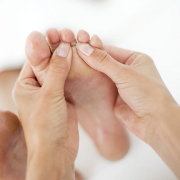The general population may know the term sciatica, and even be able to associate it with the words "back" and "pain". While this is all true, there is much more to this condition than meets the general population's eye, and you would only know this if you have dealt with the pain first hand.
Sciatica is a term described as moderate to intense pain in the right or left leg due to pressure on one or more of the five sets of nerve roots in the lower (lumbar) back. The sciatic nerve is the longest nerve in the human body and therefore when compressed can cause unbearable pain.
Generally speaking, there are six leading causes of sciatica, all stemming from a pre-existing condition. Statistically speaking, the most common cause is a herniated disc. When a disc bulges or herniates, it tends to put pressure on the neighboring nerve root, compressing more delicate nerve tissue that runs down your leg. So, if you have a herniated disc and feel more leg pain than back pain, sciatica may be your follow up problem.
The second most common cause of sciatica is spinal stenosis. In my previous articles on spinal stenosis we covered the facts and treatment for it, but I didn’t cover the possibility of it leading to sciatica. These two conditions are closely related because when the passageway in your spinal canal is narrowed due to spinal stenosis, your nerve root is compressed causing sciatica.
Although we haven’t covered spondylolisthesis, this condition – most often effecting the lumbar spine - is the third leading cause of sciatica. Spondylolisthesis is characterized when a vertebra slides forward over a neighboring one. When the vertebra slips, it often puts pressure on the nerve root, ultimately causing sciatica.
Another leading source of sciatica is rauma or injury. Prime examples would be injuries sustained in a car accident, football game or falling down stairs. The impact on your spine can injure surrounding nerves, leading to sciatica.
Piriformis syndrome is also linked to sciatica when the piriformis muscle that connects from your spine to your thigh bone is irritating the sciatic nerve – which runs beneath the piriformis muscle. This is most commonly due to muscle spasms.
And last, but certainly not least, pregnancy can cause sciatica. It is not uncommon for a woman’s growing uterus to press against the sciatic nerve causing pressure and pain. Also, postural changes from the amount of muscle tension and back compression from carrying extra weight of the fetus can cause insurmountable pain and sciatica.
Even though these are the six leading causes of sciatica, it is important to note that these are not the only culprits of causing it. There are many small habits and lifestyle habits that men and women fall into that can potentially lead them down this painful road. Not exercising regularly and being overweight are huge components, as well as wearing high heels, consistently storing your wallet in your back pocket and sitting on it all day or sleeping on a mattress that is too soft. These “self-inflicting” sciatica causing habits can add up to one big pain in your you know what. So, if its preventable, its worth keeping in the back of your mind next time you throw on the highest heels in your closet or invest in the softest mattress the store can offer you.
Check back Wednesday for a follow up article on conventional and alternative remedies for sciatica that you may find useful.






Add a CommentComments
There are no comments yet. Be the first one and get the conversation started!